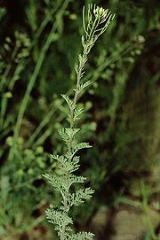
Sisymbrium sophia
Encyclopedia
Flixweed (Sisymbrium sophia) is a member of the mustard
family. It reproduces by seeds
. Its stem
is erect, branched, and 4 to 30 inches high. It was once given to patients suffering from dysentery
and called by ancient herbalists Sophia Chirurgorum, "The Wisdom of Surgeons," on account of its healing properties.
In German
, it is called the Sophienkraut and associated with Saint Sophia of Rome, who was invoked against late frosts.
Mustard plant
Mustards are several plant species in the genera Brassica and Sinapis whose small mustard seeds are used as a spice and, by grinding and mixing them with water, vinegar or other liquids, are turned into the condiment known as mustard or prepared mustard...
family. It reproduces by seeds
SEEDS
SEEDS is a voluntary organisation registered under the Societies Act of India....
. Its stem
Plant stem
A stem is one of two main structural axes of a vascular plant. The stem is normally divided into nodes and internodes, the nodes hold buds which grow into one or more leaves, inflorescence , conifer cones, roots, other stems etc. The internodes distance one node from another...
is erect, branched, and 4 to 30 inches high. It was once given to patients suffering from dysentery
Dysentery
Dysentery is an inflammatory disorder of the intestine, especially of the colon, that results in severe diarrhea containing mucus and/or blood in the faeces with fever and abdominal pain. If left untreated, dysentery can be fatal.There are differences between dysentery and normal bloody diarrhoea...
and called by ancient herbalists Sophia Chirurgorum, "The Wisdom of Surgeons," on account of its healing properties.
In German
German language
German is a West Germanic language, related to and classified alongside English and Dutch. With an estimated 90 – 98 million native speakers, German is one of the world's major languages and is the most widely-spoken first language in the European Union....
, it is called the Sophienkraut and associated with Saint Sophia of Rome, who was invoked against late frosts.

